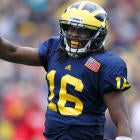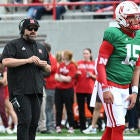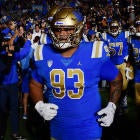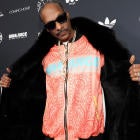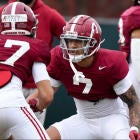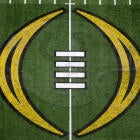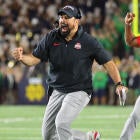On Wednesday, the NCAA's Board of Governors announced it supported proposed rule changes to allow college athletes to take advantage of their name, image and likeness rights. One of the first questions asked in response was a long-awaited one: what would this mean for the defunct "NCAA Football" video game franchise?
Fans have been clamoring for a return of the Electronic Arts video game ever since it stopped production in 2013 in the heat of the Ed O'Bannon lawsuit. Since the NCAA wasn't willing to put its name on the game nor member institutions willing to appear in it, there was essentially no game to make.
However, Wednesday's news didn't provide much optimism that the game would return in the future. Page 24 of the working group's final report states the following:
At this time, the working group is also not recommending any changes to NCAA rules to permit group licenses of student-athlete NIL in what are characterized as group products (like video games). There are legal hurdles to such activity that preclude it as a realistic option for implementation at this time. The working group recommends that the NCAA continue to explore whether those legal hurdles can be overcome through efforts described in Section VI, so that this issue can be revisited in 2021 or later.
Like many other details in the final report, the working group kicks the proverbial can down the road more than it shuts the door on the possibility. However, working group co-chair Val Ackerman, the commissioner of the Big East, also told reporters on a conference call that without a bargaining unit in place, such a task was "unworkable."
Val Ackerman says that group licensing (video games, replica jerseys) is "unworkable in college sports" largely because it does not have a union/bargaining unit.
— Nicole Auerbach (@NicoleAuerbach) April 29, 2020
Ironically, the lack of a union in college athletics is the holdup when, around the same time as the Ed O'Bannon suit, Northwestern football players were attempting to form a union. Though the NCAA is giving ground on the NIL rights platform, unionizing is an entirely different, but equally complicated situation. The problem is not that a new "NCAA Football" game wouldn't be profitable enough to pay out players for the use of their likeness, but how the funds would be distributed.
Then again, the devil is in the details about everything in the working group's report. There are a number of guardrails, regulations and restrictions before any new rules can be enacted. Moreover, the NCAA wants Congress to help craft legislation that would provide a "safe harbor" for protection against NIL lawsuits -- this, of course, being asked during a global pandemic and an election year, to boot.
In any case, the rules are expected to be written by Oct. 31 with a vote occurring no later than Jan. 31, 2021. Name, image and likeness rights would then be in effect for the 2021-22 athletic season. Whether the "NCAA Football" franchise finds its way into those rules remains to be seen, but the outlook as of April 29, 2020, isn't rosy. But if the future of a college athlete's NIL rights is at stake, the future of a video game franchise, frankly, isn't all that important.












